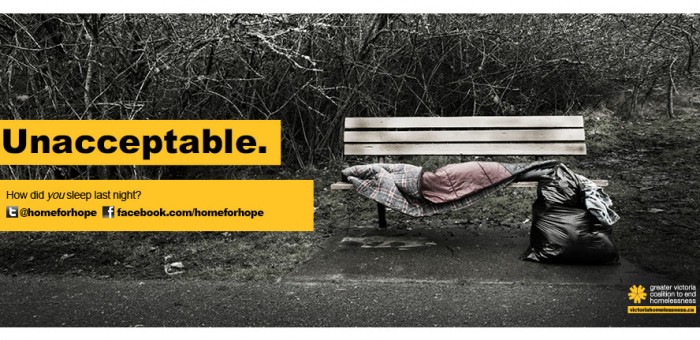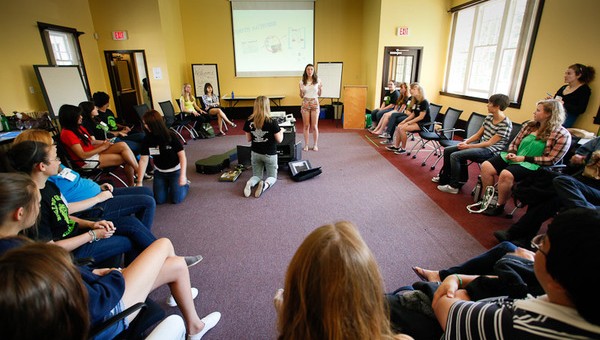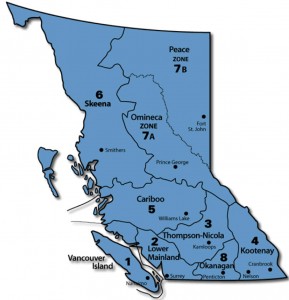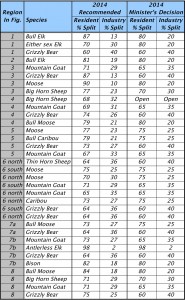Community Blog
The Government’s Role in Ending Poverty and Homelessness
Over the last few weeks I’ve been highlighting the extent of poverty and homelessness in British Columbia and, in particular, Greater Victoria. It’s clear that significant work still needs to be done to address these issues. But it’s also important to recognize the good work that has and is taking place. Through new subsidized housing units, the provision of rent supplements and other programs, local groups, in partnership with the Province, have provided housing and prevented homelessness for many vulnerable people in Greater Victoria.
Despite these efforts, combating poverty and homelessness remains a struggle, not only in British Columbia, but also throughout Canada. We cannot solely rely on the work of non-profit organizations and charitable groups to resolve these issues — they need government leadership and help from all of us. And all levels of government must step up and provide the resources and support so desperately needed.
How did we get here?
In the 1960s and 1970s, amendments to the National Housing Act (NHA) launched a number of public housing and support programs that led to the creation of around 200,000 social housing units over a 10-year span. However, these programs were short-lived due to cutbacks in social housing and related programs beginning in the mid 1980s.
Today, annual national investment in housing has decreased by over 46% and current federal operating agreements are set to expire over the next 20 years, putting an additional 365,000 Canadian households at risk.
While there have been some new investments in recent years, including fairly substantial investments towards affordable housing in 2010 and 2006, they have been time-limited.
Overall, government action on poverty continues to fall short. Federally, Canada remains the only G8 country without a national housing strategy and provincially, British Columbia remains the only province that has not committed to developing a provincial poverty reduction plan. With 3 million Canadian households in need of affordable housing and BC having one of the highest poverty rates in the country, it is time for all levels of government to take real steps forward to end poverty and homelessness in our province.
Federal Role
In April 2014, the Canadian Government announced plans to renew the Homelessness Partnering Strategy (HPS), an approach to addressing homelessness by working in partnership with communities, provinces and territories, other federal departments and the private and not-for-profit sectors. With a commitment of nearly $600 million over five years and a new focus on using a Housing First approach, this is certainly a step in the right direction.
However, concerns over the short five-year time frame, the need for support and resources at a community level and Canada’s lack of affordable housing supply, leave many concerned about the ability of this plan to produce the results the government expects.
Similarly, in March 2014 the Governments of Canada and B.C. announced plans to extend the Investment in Affordable Housing (IAH) agreement. With each level of government committing to contribute $150 million over a five year period, IAH will support a range of housing needs for low-income individuals, families and seniors. Again, many doubt the ability of this investment to truly address the growing housing need in our province.
While strategies such as these help address some of the need, they are not enough. It is time for Canada to follow suit with all other G8 countries and develop a national plan or strategy to end homelessness.
Provincial Role
In response to BC’s homelessness crisis, the provincial government recently launched its Homelessness Prevention Program. This program expands rent supplements to four at-risk groups, helping individuals facing homelessness access rental housing in the private market. However, it does nothing to provide more affordable housing.
Instead, many argue that it is time for BC to adopt a comprehensive poverty reduction plan — one that would significantly reduce poverty and homelessness through legislated targets and timelines. The BC Poverty Reduction Coalition has been particularly active in this call, stating that BC needs a plan that addresses current issues with welfare rates and barriers, minimum wage, marginalized groups, affordable housing need, and access to childcare, education and healthcare.
This past fall, the Government of Saskatchewan announced their commitment to develop such a strategy, leaving British Columbia the only province without a plan to tackle poverty. With recent reports pointing out that BC has the highest rate of wealth inequality, a very high 16.4% overall poverty rate and one of the highest child poverty rates in the country, it is time for BC to join the rest of Canada and take comprehensive, long-term steps towards ending poverty and homelessness in our province.
Community Role
While effective action is still needed at the federal and provincial level, a number of communities across Canada have been making significant strides towards ending homelessness in their cities. Through the implementation of community plans, cities such as Lethbridge and Medicine Hat are well on target to end homelessness in their communities.
One of the champions of the recent community success has been the Canadian Alliance to End Homelessness. Through their document, “A Plan Not A Dream“, CAEH outlines the critical ingredients of a community-based plan and guides cities in the creation of their own local plans.
Here in Victoria, the Coalition’s 10-year goal to end homelessness is entering into its seventh year. The realization of their goals requires a community effort. Support from all levels of government, the private and not-for-profit sectors as well as local citizens is vital to their success.
Action Item
As an MLA, I have witnessed first-hand the impact that public opinion and engagement can have on encouraging the BC government to focus on a specific issue. Therefore, this week’s action item asks you to consider communicating to decision-makers the importance of making poverty and homelessness a priority. A good start might be to contact your local MLA and let them know that you would like British Columbia to adopt a comprehensive poverty reduction plan.
Please also consider urging your friends and family to write letters or emails to local Mayors, Councillors, MLAs and MPs, and the offices of the Premier and Prime Minister. Perhaps you might wish to rally broader community support by talking to your friends and relatives about poverty and homelessness. It’s time for us to take long-lasting, substantive steps towards ending poverty and homelessness in our Province.
Celebrating youth in our community – Logan Graham
This is the fourteenth in our series of stories celebrating the outstanding accomplishments of youth in our community. These inspirational young adults are enriching our lives with their passion and commitment to the betterment of society.
Logan Graham
 Each year, 83 outstanding scholars from around the world are awarded a prestigious Rhodes Scholarship to attend Oxford University in the United Kingdom. Eleven of these students are from Canada and only one from the Province of British Columbia. Past Rhodes Scholars include former Prime Minister John Turner, former President Bill Clinton, former premiers Bob Rae (Ontario), Danny Williams (Newfoundland) and Allan Blakeney (Saskatchewan) as well as Andrew Wilkinson the MLA for Vancouver-Quilchena and Minister of Advanced Education. This year, Oak Bay High School graduate Logan Graham joins the Rhodes Scholars Elect class of 2015. In so doing, his name is added to a distinguished group of 108 previous British Columbia Rhodes Scholarship winners since 1904.
Each year, 83 outstanding scholars from around the world are awarded a prestigious Rhodes Scholarship to attend Oxford University in the United Kingdom. Eleven of these students are from Canada and only one from the Province of British Columbia. Past Rhodes Scholars include former Prime Minister John Turner, former President Bill Clinton, former premiers Bob Rae (Ontario), Danny Williams (Newfoundland) and Allan Blakeney (Saskatchewan) as well as Andrew Wilkinson the MLA for Vancouver-Quilchena and Minister of Advanced Education. This year, Oak Bay High School graduate Logan Graham joins the Rhodes Scholars Elect class of 2015. In so doing, his name is added to a distinguished group of 108 previous British Columbia Rhodes Scholarship winners since 1904.
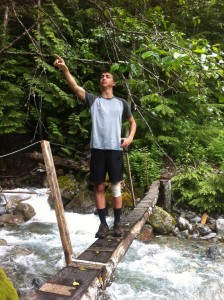 During our interview with Logan, it became obvious to us why he was awarded a 2015 Rhodes Scholarship. In just twenty years, Logan has accomplished more than many people achieve in a lifetime. And he’s done so while facing significant health challenges, having been diagnosed with rheumatoid arthritis at age 4 and suffering massive complications from the illness between ages 4 and 8 years.
During our interview with Logan, it became obvious to us why he was awarded a 2015 Rhodes Scholarship. In just twenty years, Logan has accomplished more than many people achieve in a lifetime. And he’s done so while facing significant health challenges, having been diagnosed with rheumatoid arthritis at age 4 and suffering massive complications from the illness between ages 4 and 8 years.
Logan is in his final year at UBC working towards an Honours Bachelor of Arts in Economics through funding from a UBC Major Entrance Scholarship for outstanding leadership, academics and entrepreneurship and the ConocoPhillips Centennial Scholarship administered by the Association of Universities and Colleges of Canada for young Canadian visionaries. But Logan’s family roots are here in our community. Remarkably, and coincidentally, I found out during our discussions that his uncle was James Graham (now a Fine Arts professor at the University of Lethbridge). James and I were good friends in high school and both graduated from Oak Bay in 1979. While some might argue that we are all only six degrees of separation from each other, in Victoria it’s more like one degree it seems!
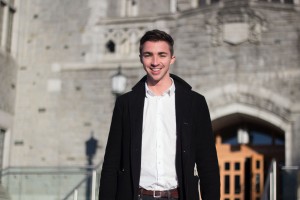 Prior to moving to Victoria with his family, Logan, who was born in Vancouver, attended West Point Grey Academy until Grade 7. At the tender age of seven, when most grade two children are focused on school, their friends and playing, Logan set out to form a foundation to advocate for children afflicted with rheumatic illnesses. That year Logan made a remarkable New Year’s resolution: “I’m going to hold a car wash and raise money for kids with arthritis”. The car wash raised $10,000 and since that first fundraising event, the Children’s Arthritis Foundation that Logan established with his parents and sister has raised over $160,000.
Prior to moving to Victoria with his family, Logan, who was born in Vancouver, attended West Point Grey Academy until Grade 7. At the tender age of seven, when most grade two children are focused on school, their friends and playing, Logan set out to form a foundation to advocate for children afflicted with rheumatic illnesses. That year Logan made a remarkable New Year’s resolution: “I’m going to hold a car wash and raise money for kids with arthritis”. The car wash raised $10,000 and since that first fundraising event, the Children’s Arthritis Foundation that Logan established with his parents and sister has raised over $160,000.
 To date, Logan, as Founder of the Children’s Arthritis Foundation has delivered presentations to over 5,000 people across Canada and the U.S., developed matching partnerships with donors and recruited several hundred students to help him run fundraisers. He’s done all of this because “kids with rheumatic illness have a really small say in the medical and political world that affects them. So over the past fourteen years, we’ve done things like provide the right shoes to kids for free, initiate the establishment of a research chair at UBC and train the next generation of health practitioners”. His motivation for starting the foundation came from a desire to help his friends – other children he had met with similar conditions.
To date, Logan, as Founder of the Children’s Arthritis Foundation has delivered presentations to over 5,000 people across Canada and the U.S., developed matching partnerships with donors and recruited several hundred students to help him run fundraisers. He’s done all of this because “kids with rheumatic illness have a really small say in the medical and political world that affects them. So over the past fourteen years, we’ve done things like provide the right shoes to kids for free, initiate the establishment of a research chair at UBC and train the next generation of health practitioners”. His motivation for starting the foundation came from a desire to help his friends – other children he had met with similar conditions.
When his family came to Victoria, Logan skipped grade 8 and went straight into grade 9 at Oak Bay High School. Not surprisingly, he excelled academically and was elected Valedictorian for his 2011 graduating class. During grade 9, he was part of the founding group of Oak Bay youth who worked with a municipal councilor whose goal was to make Oak Bay a youth-friendly place. He participated in the Leadership program at Oak Bay High and was on the Student Council. In 2010, he helped co-organize and lead an Oak Bay delegation and presentation to a Vancouver Island symposium on the recession.
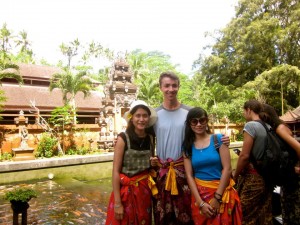 As President of the local Rotary Interact Club from 2010 to 2011, Logan worked to raise money in support of a project in Rwanda. He also coordinated a “Memory Café” through partnership with Oak Bay Lodge to hold youth-senior discussion sessions.
As President of the local Rotary Interact Club from 2010 to 2011, Logan worked to raise money in support of a project in Rwanda. He also coordinated a “Memory Café” through partnership with Oak Bay Lodge to hold youth-senior discussion sessions.
While in his last years at Oak Bay High School, Logan took up debating under the direction of Tim Bradshaw, an inspirational teacher who Logan described as the “sort of teacher where you look back and say he’s the one who opened up my eyes”. He excelled in debating and participated in several competitions including Oak Bay High’s annual Golden Gnome debate tournament, Model UN sessions, and a BC Commonwealth Debate competition hostedat St. Michaels University School.
Logan’s interest in financial economics, which ultimately took him to UBC, were nurtured and inspired by Chad Jacques, a teacher at Oak Bay. He recalls his teacher walking into business class one day and asking, “Do you know what today is”. Nobody responded. “Today is the start of a recession,” proclaimed Chad Jacques. For Logan, these words were motivating. He couldn’t believe that society could mess things up so badly; Logan went off to the library to start pouring through economics books.
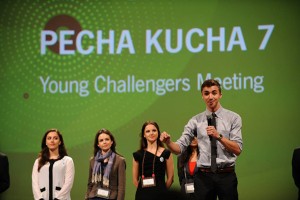 In grade 10 Chad Jacques also wrote a letter in support of Logan’s desire to attend a month long summer program at Oxford University in International Economics. Despite the prohibitive cost to register, Logan was determined to go. So during the course of the year he used his entrepreneurial skills to set up an estate management and home care company that allowed him to subsequently earn the $10,000 required. Clients were easy for him to come by, as his compelling story about wanting to attend the program at Oxford University was a door opener.
In grade 10 Chad Jacques also wrote a letter in support of Logan’s desire to attend a month long summer program at Oxford University in International Economics. Despite the prohibitive cost to register, Logan was determined to go. So during the course of the year he used his entrepreneurial skills to set up an estate management and home care company that allowed him to subsequently earn the $10,000 required. Clients were easy for him to come by, as his compelling story about wanting to attend the program at Oxford University was a door opener.
Ever since Logan was ten years old, he knew that Oxford was “a place I want to end up”. During a family vacation “his eyes lit up” at the magnificence and splendor of Oxford’s collegiate architecture. And sure enough, in 2015 Logan will fulfill his dream as he starts an MPhil in Economics.
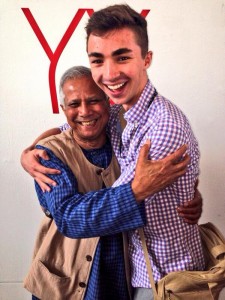 Having grown up in an entrepreneurial family environment, Logan knows what it means to take risks, show leadership and develop a strategy to reach one’s goals. In his first year at UBC, he founded the UBC Social Enterprise Club, as a place for student to apply “business techniques to real-life situations in order to solve social issues”. His passion for social enterprise together with his recognition of the need to facilitate ways for students to become involved in innovative business ventures that have significant social impact, has ensured the club has been a huge success. Through the club, hundreds of students and high-profile social impact professionals have come together to help bring ideas into reality. The club has created three employment opportunities by establishing Canada’s first student social venture consultancy and consulting with nine fast-growth local social ventures.
Having grown up in an entrepreneurial family environment, Logan knows what it means to take risks, show leadership and develop a strategy to reach one’s goals. In his first year at UBC, he founded the UBC Social Enterprise Club, as a place for student to apply “business techniques to real-life situations in order to solve social issues”. His passion for social enterprise together with his recognition of the need to facilitate ways for students to become involved in innovative business ventures that have significant social impact, has ensured the club has been a huge success. Through the club, hundreds of students and high-profile social impact professionals have come together to help bring ideas into reality. The club has created three employment opportunities by establishing Canada’s first student social venture consultancy and consulting with nine fast-growth local social ventures.
Last year, while attending the Global Social Business Summit in Kuala Lumpur, Malaysia Logan had the good fortune to meet 2006 Nobel Peace Prize winner Muhammad Yunus, founder of the Grameen Bank (known as the Bank of the Poor) and the concept of microfinancing in Bangladesh during the 1970s. Inspired by this workshop that was designed to bring young social entrepreneurs together with established more seasoned world leaders, Logan, along with three of his peers, launched another organization called: Yunus & Youth. This online platform connects young entrepreneurs and pairs them with world-renowned mentors, trains them with these experts and connects them with a global support network.
 Logan has a strong desire to continue to travel the world. After an exchange to the National University of Singapore in 2013 he had the opportunity to backpack around parts of China and was fascinated by what he witnessed. Logan commented to us on how China’s remarkable economic growth in recent years can be viewed as the world’s “single best poverty reduction program”. Sometime in the future Logan see himself spending time working in China, perhaps Guangzhou, a city he found to be most welcoming and exhilarating.
Logan has a strong desire to continue to travel the world. After an exchange to the National University of Singapore in 2013 he had the opportunity to backpack around parts of China and was fascinated by what he witnessed. Logan commented to us on how China’s remarkable economic growth in recent years can be viewed as the world’s “single best poverty reduction program”. Sometime in the future Logan see himself spending time working in China, perhaps Guangzhou, a city he found to be most welcoming and exhilarating.
An article from the UBC Vancouver School of Economics aptly notes that Logan is “an entrepreneur with a passion for using the principles of economics to solve social problems”. Whether at school, in business, or DJing under the catchy handle “Logarhythm”, Logan excels in all that he does. Yet family, and in particular his sister, are incredibly important to Logan. They struggled together as Logan battled rheumatoid arthritis at an early age. Logan is never short of praise for his family. He described his sister Tookie as “the smartest most caring person I know” and on social media when letting his friends know about his award he started off by saying: “Before anything else, I want to say that my biggest mentor, educator and inspiration has always been my sister Tookie Graham. From the moment you first tried to drag me through the bars of my crib, you have always been trying to show me the world.”
Logan views the Rhodes Scholarship as “a free path to learn about anything and then challenge everything”. I’m sure he had no idea how inspiring it was for me to hear him describe his academic aspirations in such terms. Whether it is poverty and homelessness, global population growth and sustainable development, climate change and water availability, or sustaining global biodiversity, the world’s greatest challenges require creative approaches in developing innovative solutions. We need visionaries in today’s youth to emerge as our political leaders of tomorrow. And it is our job, as the decisison-makers of today, to remove the barriers that otherwise would limit these social entrepreneurs from succeeding. Thank you Logan for all that you do.
Resident BC Hunters Given Short End of the Stick
Earlier this month the BC government gave British Columbia’s 100,000+ hunters a rather astonishing Christmas present.
On December 10th, the Minister of Forests, Lands and Natural Resource Operations announced his decision concerning how hunting licenses would be allocated between industry and British Columbia’s resident hunters. In what ended up being a surprise to many people – and in stark contrast to the advice he received from his own staff – the Minister chose to increase the proportion of hunting licenses that would be available for the guide outfitting industry at the expense of resident BC hunters. For many BC hunters, this was like adding salt to an existing wound. Over the last decade there had already been a steady erosion of their allocation relative to industry’s.
I sincerely hope that the government reconsiders this decision as in my view it’s not in the public interest.
The allocation of hunting permits between industry and residents involves an extensive consultation process between the Guide Outfitting Industry (represented by the Guide Outfitters Association of BC, — GOABC), resident BC hunters (represented by the BC Wildlife Federation —BCWF) and the provincial government. The purpose of this process is to ensure that all interests are represented in a consistent, fair and transparent way. Ministry staff subsequently take recommendations to the Minster on how permits should be allocated sustainably, with a priority placed on meeting the social and ceremonial needs of First Nations while also maintaining healthy wildlife populations.
This time the allocation process seemed to take on a life of its own. Rather than accepting the permit allocation recommendations as in the past, a very different set of numbers were provided in the Minister’s decision. No one I have spoken to has any idea where these numbers came from. Certainly they did not come from the allocation process or expert advice.
Figure: British Columbia’s eight hunting regions (left) and a table (right) showing the recommended allocations as well as the Minister’s final decision.
Contrary to the established Harvest Allocation Policy and the consultation process that developed it, this new decision allocates a large increase in the proportion of licenses available to industry at the expense of resident hunters. In addition, the Harvest Allocation Policy specifically states:
Many of the changes in the table above can hardly be described as gradual. And it’s certainly not clear to me that resident hunters were a treated as a priority in light of the fact that these numbers differed so much from those recommended through the consultation process.
So why is this important?
This is yet another example of government putting the needs of special interests ahead of British Columbians. Hunting is an important part of life for many British Columbians; for quite a few, hunting provides an important source of protein for their families. In addition, resident hunters working under the umbrella of the BCWF have a rich history of conservation. And the BCWF cites a twenty percent growth in the number of BC hunters over the past 10 years.
This is not the first time that I have raised a question about how the Guide Outfitting industry is being regulated by this government. This past spring legislation was introduced that removed the requirement that a guide outfit could only be owned by a citizen of of our province. In my view, hunting priorities in British Columbia should be focused on ensuring healthy wildlife populations and meeting the needs of British Columbians. They should not have these priorities trumped by corporate interests especially now that can also be foreign-owned.
I have raised similar concerns in the past about the Grizzly Bear Trophy hunt. Unlike the Black Bear hunt, where hunters are required to “remove from the carcass the edible portions of the four quarters and loins to the person’s normal dwelling place or to a meat cutter or the owner or operator of a cold storage plant“, there is no such requirement in the case of Grizzlies. Most British Columbians, including the hunters I have spoken with, are not supportive of the trophy kill. Even the simple requirement of forcing hunters to remove all edible portions from grizzlies, as in the case for black bears, would be a step in the right direction.
In his June 2014 mandate letter, the Minister of Forests, Lands and Natural Resource Operations was directed to “continue to work with BC Guides and Outfitters and other back country operators to ensure continued access and business certainty to Crown land and provide economic and tourism opportunities in rural British Columbia.” What’s clearly missing from this mandate is the requirement that this not be done at the expense of British Columbians.
If you are as concerned about this development as I am, please take the time to write to your MLA and the Minister. You might also consider signing the petition that has been put together by the BC Wildlife Federation and/or a similar petition at change.org.
Celebrating youth in our community – Chloe Van Neutegem
This is the thirteenth in our series of stories celebrating the outstanding accomplishments of youth in our community. These inspirational young adults are enriching our lives with their passion and commitment to the betterment of society.
Chloe Van Neutegem
 It’s customary on Wednesdays and Fridays for evenings to include reading through the local Oak Bay and Saanich News. This past Friday was no different. But imagine our surprise. We were in the middle of putting together the finishing touches on this article when lo and behold, and to our great delight, there she was…featured in an article about Oak Bay High School’s Youth Against Cancer Group — a group co-led by Chloe. When we interviewed Chloe just a few weeks earlier she had enthusiastically described to us her plans with the Youth against Cancer Group. It was wonderful to see their ideas come to fruition.
It’s customary on Wednesdays and Fridays for evenings to include reading through the local Oak Bay and Saanich News. This past Friday was no different. But imagine our surprise. We were in the middle of putting together the finishing touches on this article when lo and behold, and to our great delight, there she was…featured in an article about Oak Bay High School’s Youth Against Cancer Group — a group co-led by Chloe. When we interviewed Chloe just a few weeks earlier she had enthusiastically described to us her plans with the Youth against Cancer Group. It was wonderful to see their ideas come to fruition.
Chloe was born in Southampton, England and moved Victoria when she was eight. She attended Monterey Elementary for Grades 3 and 4, Willows elementary for Grade 5 and Monterey Middle School for Grades 6 to 8. She has been at Oak Bay High School since Grade 9 and is currently in her graduating year. As one might imagine, she’s an exceptional student, with a 90% average in Grade 11.
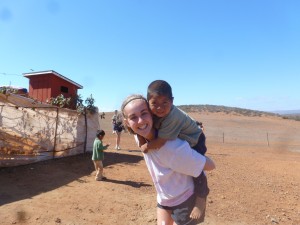 Chloe has been extensively involve in school and community activities for which she was recognized last year in receiving Oak Bay High’s Green and White Award for excellence in school and community service. Most recently, Chloe describes being humbled by her humanitarian efforts on the “Hero Holiday” in 2013, when she travelled to Mexico with a group of students from her school to help build two homes for Mexican families. “It was an experience I’ll never forget. It opened my eyes up to things we can never really understand unless we experience them. I’ll tell my kids about the trip someday so they will care about this too”. In order to take part in the Hero Holiday, a lot of fundraising had to be done. Chloe was involved in 3 major fundraising events: a “Jail or Bail” event, a Mexican Fiesta Night and a Silent Auction.
Chloe has been extensively involve in school and community activities for which she was recognized last year in receiving Oak Bay High’s Green and White Award for excellence in school and community service. Most recently, Chloe describes being humbled by her humanitarian efforts on the “Hero Holiday” in 2013, when she travelled to Mexico with a group of students from her school to help build two homes for Mexican families. “It was an experience I’ll never forget. It opened my eyes up to things we can never really understand unless we experience them. I’ll tell my kids about the trip someday so they will care about this too”. In order to take part in the Hero Holiday, a lot of fundraising had to be done. Chloe was involved in 3 major fundraising events: a “Jail or Bail” event, a Mexican Fiesta Night and a Silent Auction.
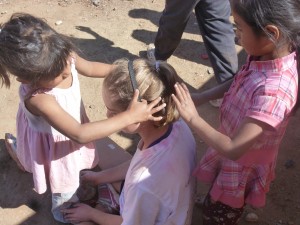 While on the hero Holiday, Chloe became close with an “adorable” seven-year-old girl named Ana Jasmine. Ana Jasmine possessed limited English but that didn’t stop them communicating with their own form of sign language. Ana Jasmine loved piggyback rides, as did all the children they encountered there. And she especially “liked to play with my hair”. As a parting gift, Chloe gave her a beret as a keepsake. But in her broken English and unique sign language the seven-year-old let Chloe know that she couldn’t take it as it looked so good on Chloe.
While on the hero Holiday, Chloe became close with an “adorable” seven-year-old girl named Ana Jasmine. Ana Jasmine possessed limited English but that didn’t stop them communicating with their own form of sign language. Ana Jasmine loved piggyback rides, as did all the children they encountered there. And she especially “liked to play with my hair”. As a parting gift, Chloe gave her a beret as a keepsake. But in her broken English and unique sign language the seven-year-old let Chloe know that she couldn’t take it as it looked so good on Chloe.
The Oak Bay students stayed with families in the community while they worked on the house-building project. Chloe warmly recalled how they were made to feel “like a part of the family” and that their hosts “had the best food!” She was inspired to become involved in the Hero Holiday by her 13-month older sister Ella, who had participated herself previously. In fact, Chloe praised Ella numerous times during the interview as being a wonderful, positive role model in her life; they are very close.
 Two initiatives that Chloe has devoted enormous time and energy to are Cops for Cancer Tour de Rock and the school’s Youth Against Cancer group. Last year, she cut 17 inches off her hair to raise $2,500.00 for Cops for Cancer. She and her very good friend Ana Adams also organized a bottle drive that brought in $5,500.00 for this year’s campaign. This year she also coordinated a live grad auction for Cops for Cancer — grad services (including things like dinner preparation) were “purchased” for a week. Chloe’s leadership role in the school’s Youth Against Cancer Group has meant working to increase awareness of issues such as the risks associated with tanning beds and the dangers of flavoured tobacco. The Youth Against Cancer group also holds school fundraisers — including Muffin Morning Mondays — with proceeds being donated to the Cancer Society. As noted in the Oak Bay News article, they prepare Smile Packages for cancer patients who are in for treatment during the Christmas season. This year they went one step further by decorating Canadian Cancer Society’s Vancouver Island Lodge.
Two initiatives that Chloe has devoted enormous time and energy to are Cops for Cancer Tour de Rock and the school’s Youth Against Cancer group. Last year, she cut 17 inches off her hair to raise $2,500.00 for Cops for Cancer. She and her very good friend Ana Adams also organized a bottle drive that brought in $5,500.00 for this year’s campaign. This year she also coordinated a live grad auction for Cops for Cancer — grad services (including things like dinner preparation) were “purchased” for a week. Chloe’s leadership role in the school’s Youth Against Cancer Group has meant working to increase awareness of issues such as the risks associated with tanning beds and the dangers of flavoured tobacco. The Youth Against Cancer group also holds school fundraisers — including Muffin Morning Mondays — with proceeds being donated to the Cancer Society. As noted in the Oak Bay News article, they prepare Smile Packages for cancer patients who are in for treatment during the Christmas season. This year they went one step further by decorating Canadian Cancer Society’s Vancouver Island Lodge.
Chloe adds volunteering at the Royal Jubilee hospital on Wednesdays to her already packed list of activities. There she chats with patients, delivers books and “gives them an ear – someone who will listen”. While some of conversations revolve simply around complaints about the food, more often than not, they are “really interesting” and she’s heard “a lot of amazing stories”. She thoroughly enjoys these visits and hearing from the largely elderly patients she encounters.
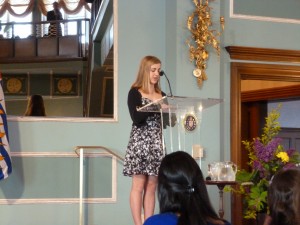 Chloe is presently taking a heavy load of mathematics and sciences in her final year in preparation for university where she hopes to enroll in a Kinesiology or Human Kinetics program. She eventually wants to practice as a physiotherapist or occupational therapist.
Chloe is presently taking a heavy load of mathematics and sciences in her final year in preparation for university where she hopes to enroll in a Kinesiology or Human Kinetics program. She eventually wants to practice as a physiotherapist or occupational therapist.
Summers are also a busy time for Chloe. For three years now she has been employed as an assistant teacher in the Victoria International High School Program. There she facilitates interactions between the international students and takes them on outings such as hiking and kayaking. In addition to supporting the students as they improve their English, Chloe helps with organization and program development. She also somehow manages to hold down a part time retail sales clerk job.
While noting there are many great teachers at Oak Bay High, Chloe has been particularly inspired by Roxanne Taggart, the sponsor teacher for Youth Against Cancer, who “is always there when you need her help” and Murray Allan “who really steps up and motivates us – although he can be hard on us, it helps us achieve our goals”.
 Chloe loves sports, especially soccer; she’s played with Bays United since moving to Victoria at age 8. Chloe also enjoyed basketball and played on her school team in Grades 9 and 10 as well as the in the local Night League. In 2011 Chloe played on the school volleyball team and in the past she has coached a Grade 6 girls’ team at Monterey Middle School.
Chloe loves sports, especially soccer; she’s played with Bays United since moving to Victoria at age 8. Chloe also enjoyed basketball and played on her school team in Grades 9 and 10 as well as the in the local Night League. In 2011 Chloe played on the school volleyball team and in the past she has coached a Grade 6 girls’ team at Monterey Middle School.
Chloe has learned the importance of teamwork through sports and her many extracurricular activities at school and in the community. She is a born leader and someone who can be counted on to follow through with any commitment that she makes. The fact that she is able to accomplish so much outside of school while still maintaining a very high average in a challenging academic program is a testament to Chloe’s dedication, commitment and organizational skills. She’s a proven team player and team leader. In fact, we wouldn’t be surprised to find out that ten years from now, Chloe is the head physiotherapist working with a semi-professional, or professional sports team. Thank you Chloe for all that you do to improve the lives of those in our community.
Guide outfitter industry prioritized over the needs of BC hunters
Media Statement: December 15, 2014
Guide outfitter industry prioritized over the needs of BC hunters
For immediate release
Victoria, B.C. –The Government of British Columbia’s recent decision to prioritize the guide outfitting industry over the interests of resident British Columbia hunters is directly contrary to the public interest says Andrew Weaver, MLA for Oak Bay-Gordon Head and Deputy Leader of the BC Green Party.
On December 10th, 2014 the Minister of Forests, Lands and Natural Resource Operations released his decision concerning how hunting licenses would be allocated between industry and British Columbians.
Contrary to the established Wildlife Allocation Policy, and the consultation process that developed it, this new decision allocated a massive increase in the proportion of licenses available to industry. This means that BC hunters, many of whom hunt for sustenance, may go without licenses this year.
“What we are seeing is the needs of industry being placed ahead of the needs of British Columbia residents,” said Andrew Weaver. “Last spring we had legislation passed that allowed guide outfitting operations to be owned by a foreign corporations, and now the government is supporting this industry on the backs of British Columbians.”
In February 2013, the government introduced the Forests, Lands and Natural Resource Operations Statutes Amendment Act, 2014, which overhauled guide outfitting in BC. Importantly, it removed the requirement that a guide outfit can only be owned by a citizen of British Columbia, opening up the possibly that guide outfitters are owned and operated by corporations from other countries.
Since the legislation passed, government has maintained a focus on advancing the interests of this industry without mention of how it will affect BC hunters. In his June 2014 mandate letter, the Minister of Forests, Lands and Natural Resource Operations was directed to “continue to work with BC Guides and Outfitters and other back country operators to ensure continued access and business certainty to Crown land and provide economic and tourism opportunities in rural British Columbia.”
“There are over 100,000 British Columbia residents who hunt each year, a number that has been growing over time,” said Andrew Weaver. “This government needs to halt their current approach to wildlife management and ensure that it is British Columbians who benefit from their policies.”
“I fail to see why they are advancing the interests of this industry ahead of the interests of British Columbians,” said Andrew Weaver.
-30-
Media Contact
Mat Wright – Press Secretary, Andrew Weaver MLA
Mat.Wright@leg.bc.ca
Cell: 1 250 216 3382

